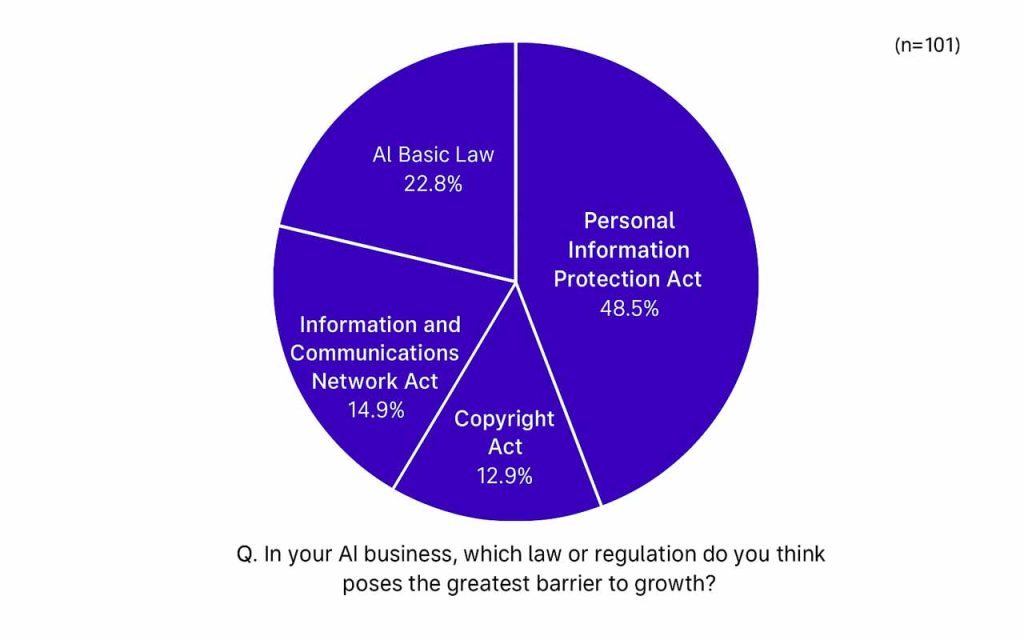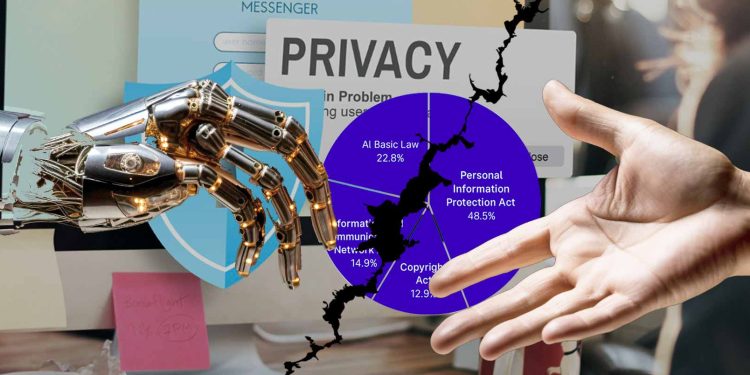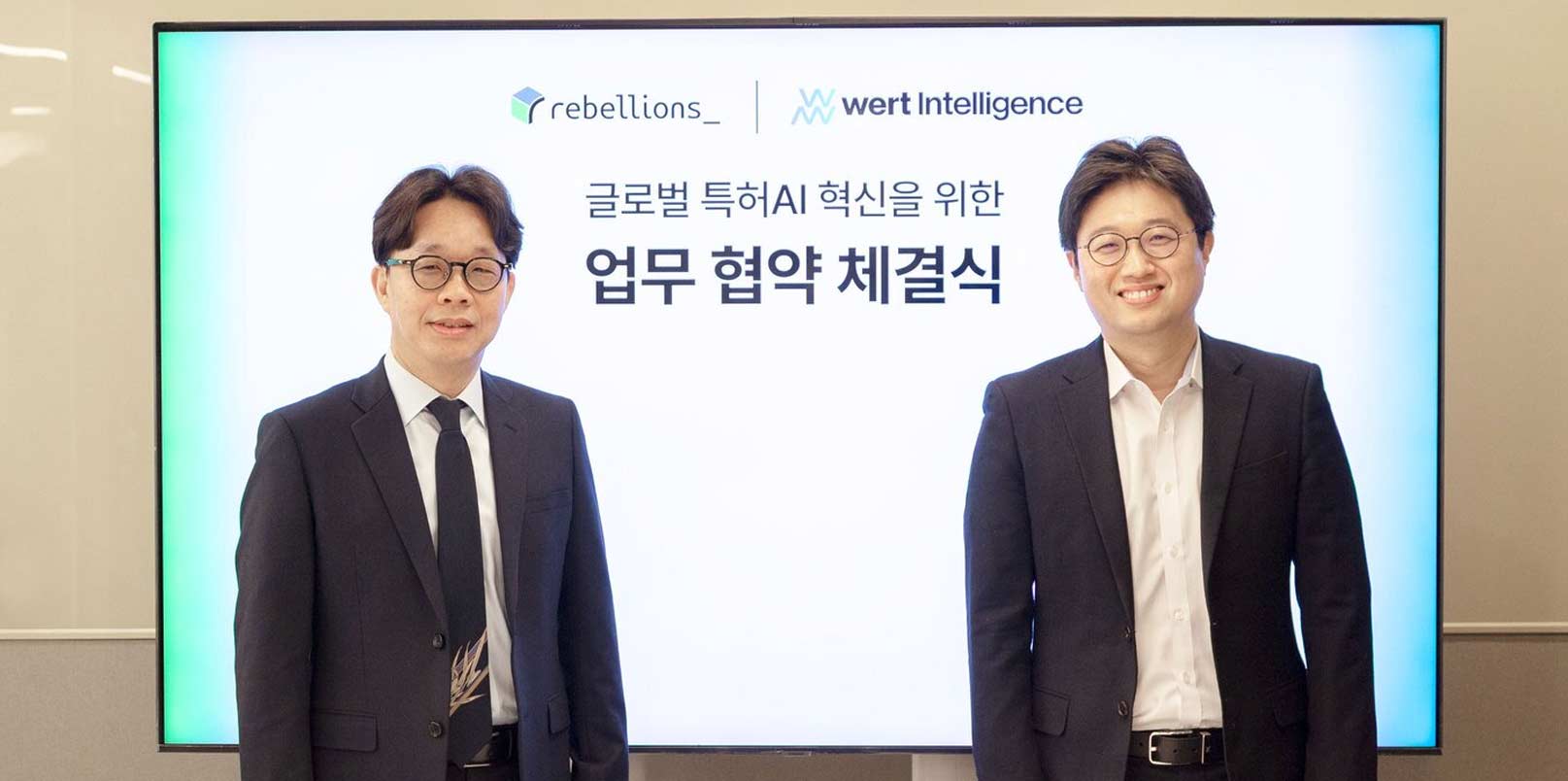As artificial intelligence becomes the new economic engine, Korea’s next challenge is not computing power—it’s data governance. While startups race to build competitive AI models, privacy laws designed before the AI boom are increasingly considered as holding them back. The nation’s ability to lead the next wave of innovation may depend on how it reconciles personal data protection with the freedom to innovate.
AI Startups Struggle Under the Weight of Strict Data Laws
A recent survey by Startup Alliance reveals that 71% of Korean AI startups find the Personal Information Protection Act (PIPA) restrictive for data use.
Out of 101 startups surveyed between September 10 and 19, nearly half (48.5%) named PIPA as the single greatest barrier to AI growth, followed by the AI Basic Law (22.8%), Information and Communications Network Act (14.9%), and Copyright Act (12.9%).
Korea’s privacy framework was built around individual consent for every piece of data collected. This resulted in massive challenges for AI training, making it impossible and unrealistic for startups working with unstructured or web-crawled dataset to acquire user consent at that scale.
In markets like the EU and UK, data processing can occur under lawful grounds such as ‘legitimate interest’ or defined research exceptions, giving companies broader room to innovate. In contrast, Korean firms remain bound by consent-first data protection structures that impose heavy administrative and financial burdens.

Why the Debate Goes Beyond Compliance
Now, this issue extends beyond regulatory compliance and reflects deeper structural constraints in Korea’s innovation framework.
Korean AI firms argue that while laws focus on personal data protection, they fail to recognize how modern AI systems learn. Large-scale, unstructured datasets are the foundation of generative AI and LLMs, and consent-based collection cannot match that scale.
At the same time, privacy advocates warn that deregulation could expose citizens’ personal data to potential misuse or re-identification, even if anonymized.
And so, the tension reflects a growing dilemma: how to sustain innovation without eroding public trust.
What AI Startups Are Asking For
The Startup Alliance report distilled the voices of 101 AI startups and policy experts into a unified set of reform priorities aimed at making Korea’s data governance more innovation ready. Key proposals include:
1. Expanding Legal Grounds for Data Use Beyond Consent
Startups emphasized that the current consent-first system is unworkable for large-scale AI model training. Experts suggest introducing flexible legal bases, such as the EU’s legitimate interest clause, to allow lawful and accountable data processing.
2. Simplifying Complex Approval and Anonymization Processes
Companies cite excessive procedural delays when combining or pseudonymizing data. Streamlined review standards and clearer anonymization guidelines could reduce costs and uncertainty.
3. Creating AI-Specific Data-Use Exceptions
The current special exemptions for AI learning are viewed as overly bureaucratic. A lighter, more adaptive approval model would better fit the rapid development cycles of AI startups.
4. Clarifying Copyright and Fair-Use Boundaries
Many AI datasets include text, images, or sound materials covered by copyright. The report calls for explicit text and data mining (TDM) provisions and detailed fair-use guidelines to reduce legal ambiguity.
5. Shifting Toward Data-Utilization-Centered Governance
Korea’s data policy has traditionally emphasized protection. The report urges a balanced framework that preserves privacy while recognizing data as the essential driver of AI innovation.
Together, these recommendations underscore a shared goal across the startup ecosystem and policymakers: to modernize regulation in a way that protects citizens while enabling responsible technological advancement.
Inside the Policy Tug-of-War: Data Protection VS AI Innovation
The divide between innovation and regulation is becoming one of Korea’s defining technology debates. As the AI sector races forward, policymakers and founders are caught between two imperatives — protecting citizens’ data and giving startups room to innovate.
Head of the Startup Alliance Lee Gi-dae stated,
“AI competitiveness no longer depends on GPUs or compute power. Innovation requires an environment where companies can use data legally and responsibly.”
Others in the industry echo the urgency but caution against confusing reform with deregulation, saying:
“While global competitors train models on enormous datasets, local firms are trapped in regulatory uncertainty. We need clarity, not deregulation.”
These statements capture the broader tension shaping Korea’s AI trajectory — a system that must evolve fast enough to empower innovation without eroding the foundation of trust it was built upon.
Toward Balanced Governance in Data Protection and Fostering AI Innovation
Experts emphasize that reform should never come at the cost of personal data protection. Instead, experts suggest that Korea’s regulatory evolution could adopt a dual-framework approach, ensuring both accessibility and accountability in data use.:
- Create government-supervised data sandboxes that allow AI model training under defined oversight and ethical standards.
- Mandate auditable transparency systems so citizens know when and how their data is used.
- Differentiate AI data categories to clearly separate personal, pseudonymized, and non-personal information.
Such measures could enable Korea to foster innovation while safeguarding the very rights that give its digital economy long-term legitimacy.
The Stakes for Korea’s AI Future
The direction of Korea’s regulatory reform will decide far more than the pace of startup growth. It will shape how the country positions itself in the global AI landscape. If policymakers succeed in modernizing the legal framework while keeping privacy protections intact, Korea could become a reference point in Asia for responsible and scalable AI innovation.
If reform stalls, however, the gap with regions that already operate under clearer governance structures will widen. The EU, Japan, and Singapore have begun enabling safer, more predictable data environments. Korean startups risk losing competitive momentum unless the legal foundation evolves to match the speed of technological change.
Redefining the Balance Between Privacy and Innovation
Korea’s AI future depends on its ability to rewrite the rules of trust. Privacy and innovation do not have to stand on opposite sides, yet the balance between them must keep evolving.
The current debate goes beyond legal drafting and reflects how Korea envisions technological leadership in a world where data itself has become both the fuel of progress and the boundary of ethics.
– Stay Ahead in Korea’s Startup Scene –
Get real-time insights, funding updates, and policy shifts shaping Korea’s innovation ecosystem.
➡️ Follow KoreaTechDesk on LinkedIn, X (Twitter), Threads, Bluesky, Telegram, Facebook, and WhatsApp Channel.





